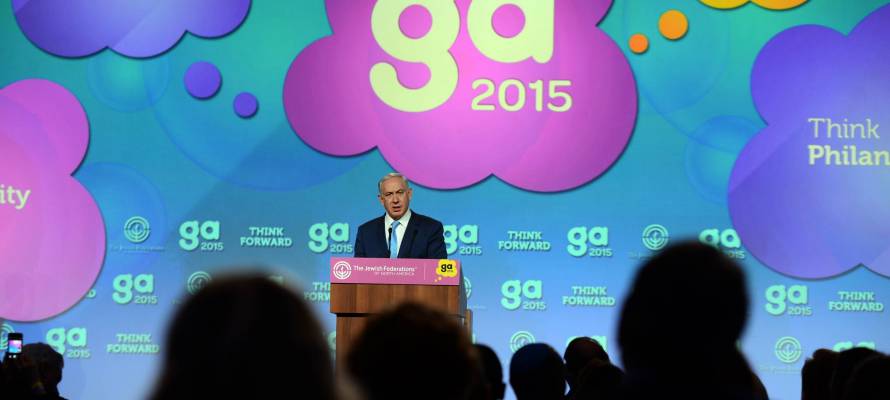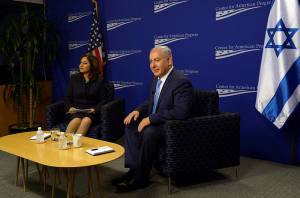
Netanyahu at the event Tuesday in Washington organized by the Center for American Progress with CAP President Neera Tanden. (Haim Zach/GPO)
Addressing two major Jewish audiences during his Washington trip, Netanyahu stressed Israel’s excellent ties with Washington, and global humanitarianism. He blamed the absence of a peace agreement with the Palestinians on the latter’s refusal to recognize a Jewish state, saying the issue has nothing to do with borders.
Despite the differences in the two influential Jewish audiences that Prime Minister Benjamin Netanyahu addressed in Washington on Tuesday – the Jewish Federations of North America (JFNA) and the left-leaning Center for American Progress (CAP) – his message was basically the same. In a nutshell, he said it is crucial that Israel remain an issue of bi-partisan consensus; the strong US-Israel friendship is mutually valuable; maintaining unity between the Jewish state and the Diaspora is of major importance; Israel respects diversity and equality among all its citizens, irrespective of race and religion; Israel makes profound global contributions, not only in technology, but also in leading assistance to other nations and peoples in times of crisis; and Israel must maintain defensible borders in order to survive the rise of militant Islam. He also asserted that the reason there is no peace agreement between Israel and the Palestinians is that the Palestinian leadership refuses to recognize a Jewish state within any boundaries.
The events took place after Netanyahu’s Monday morning talk with US President Barack Obama, which the Israeli leader described as “one of the best meetings I have had with Obama, and I think the other side felt the same way.”
“No matter what disagreements there are between Israel and the United States, Israel has no better friend than America, and America has no better friend than Israel,” Netanyahu said in a speech to the JFNA General Assembly. “The United States is giving indispensable help to Israel, indispensable, but Israel is returning that assistance almost on a daily basis in intelligence and in many other things.”
“No matter what disagreements there have been within the Jewish community, maintaining the unity of our people is of paramount importance,” he stressed.
Advanced Technology and Cyber Security
Netanyahu provided specific details in water technology as an example of Israeli innovation and its contribution to the world: “We had twice the rainfall in 1948, the year of Israel’s founding and one-tenth the population. So in 67 years, the water supply has gone down by half from rainfall, roughly half, and the population has grown ten times. Our GDP per capita has grown 40 times, and with it goes water usage. So we had to have a big water problem, but we don’t. We have a water surplus. Israel leads the world by far in the recycling of waste water and in so many other technologies related to water. And people are coming to us and they say: Teach us… We can do it in Asia, in Africa, in Latin America. Every week somebody else comes and says, teach us how to get water out of the stone.”
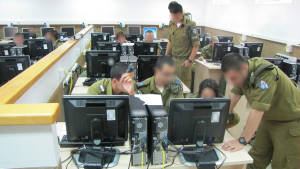
Cadets in the IDF Cyber Defense Unit course. (IDF)
In cyber security, “Israel is punching 200 times above its weight,” he declared.
Furthermore, “Israel’s GDP per capita has surpassed the European average and…it surpassed that of Japan. And as our economy has grown, so has the reach of Israeli exports. Today Israel is dramatically increasing trade with India and China… They’re two small countries, and together with our small country, we encompass about a third of the population of the world.”
As for tolerance and diversity, the Israeli leader reminded the audience that the “only Christian population in the Middle East that is growing and thriving, and not shrinking and being decimated,” is in Israel.
“An Arab schoolboy [in Israel] knows that – or schoolgirl – they can grow up to be Knesset members or ambassadors or a Supreme Court justice,” he added.
Global Humanitarian Leadership
“You see our compassion when you visit the hospitals, the field hospital that we’ve set up that treats thousands of wounded Syrians from the battles inside the Syrian inferno…. We take care of them at our expense.”
“You won’t read about it, but you should know about it,” he said, in seeming reference to the global media bias against Israel.
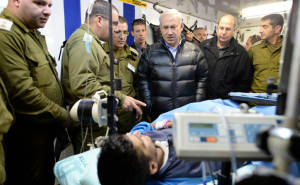
Israeli PM Benjamin Netanyahu in May visited an IDF field hospital that treats wounded from the civil war in Syria. (Kobi Gideon/GPO/FLASH90)
He also mentioned Israel’s leadership in global humanitarian efforts, such as in Haiti and Nepal, noting, “What is truly remarkable is that Israel upholds these values in the darkest and most oppressive region on earth and when facing unmatched security challenges…
“Israel is surrounded by many forces driven by fanaticism and hatred. Militant Islam is on the march.”
Despite the profound challenges, “Israel…a great country, a deeply moral country…is constantly judged by many in the international community according to a standard of perfection that is applied to no other country and that no country could possibly meet,” the prime minister continued, asserting that holding the Jewish state to different standards is motivated by anti-Semitism. “We recognize it for what it is,” he said.
No Territorial Dispute
The reason there is no peace with the Palestinians is “not because of the settlements or a territorial dispute, the territories that that were won in our defensive war of 1967. Israelis and Palestinians had a conflict for half a century – almost 50 years – before Israel captured any of those territories or built even a single one of those settlements. And afterwards, we left part of that territory – Gaza. Left it to the very last centimeter or inch. Stripped out the settlements, went to the ’67 boundaries, uprooted all the people who were there, disinterred people from their graves. What did we get? Peace? We got rockets,” Netanyahu explained to the JFNA audience, adding that Israel truly seeks peace.
“The truth is that the reason that there isn’t peace between Israelis and Palestinians is the persistent Palestinian refusal to recognize the Jewish state in any boundary. That’s the truth. If you recognize the problem, you’ll be able to get to its solution.”
Although his speech to CAP was similar, it was a tougher audience, with questions challenging Israeli policy on territories liberated in the 1967 Six Day War and Netanyahu’s controversial appeal to voters a day ahead of the March 2015 national election to counter Arab voters, who were “coming out in droves.”
Netanyahu: ‘Arabs Voted for Me’
“The statement as it was said, was wrong,” he acknowledged to the CAP audience, explaining that he was referring not to Israeli Arabs in general, but specifically to those supporting the Joint Arab List party.
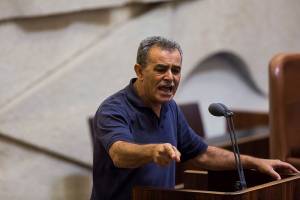
Member of Knesset Jamal Zahalka. (Yonatan Sindel/Flash90)
In fact, that party includes several hostile parliamentarians, such as Hanin Zoabi, who just this week compared the Israeli government to the Nazis, and Jamal Zahalka, who was caught on film several weeks ago abusing Jewish visitors to the Temple Mount in the Old City of Jerusalem.
“You should know that Arabs voted for me…in a considerably larger number than for the Labor party…and I welcome that,” Netanyahu continued, saying that he has done more to help the Arab sector than previous prime ministers, such as significant budgetary support for education and other initiatives. “It comes also from a political philosophy that I follow, especially the teachings of [pre-State Revisionst Zionist leader] Ze’ev Jabotinsky, who believed in having an egalitarian state.
“I am the prime minister of all the citizens of Israel. Those who voted for me, those who did not vote for me; Jews, Arabs, Druze, Circassians, Muslims, Christians,” he stated.
No Current Solution to Temple Mount Debate
As for Jerusalem and the Temple Mount, “I just do not see right now a solution for that,” Netanyahu said. “It has to remain under Israeli sovereignty. That is the only way to prevent this from exploding into a sectarian strife.”
Regarding the conflict with the Palestinians, “Just about any Israeli in his right mind agrees with what I’m about to tell you: Any deal or any arrangement, unilateral or negotiated, must have Israel maintain the ability to defend itself, by itself, against any threat, including from territories that are ceded. That’s the most important provision. That’s something I don’t see Palestinians accepting now.”
